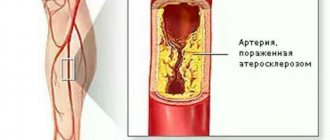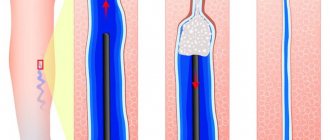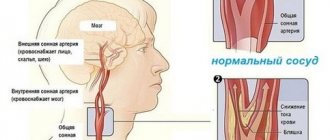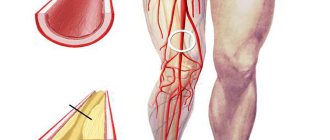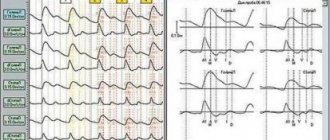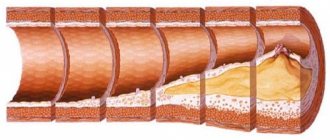Mechanism of action of alcohol
Changes in the lumen of blood vessels are directly related to an increase or decrease in blood pressure on the walls of blood vessels, which, in turn, affects the functioning of the entire cardiovascular system and the brain.
Some people, based on their experience, claim that they feel better after drinking a small amount of alcohol. Others have the opposite opinion. We can say that both are right.
A few minutes after ethyl alcohol enters the body, the blood vessels dilate, the tone of the walls decreases, they become relaxed, and blood pressure decreases. If you take a small dose of 15-20 ml, this positive effect is observed for hypertensive patients. However, at the same time, blood is pushed out of the heart under low pressure, which is why it does not reach remote areas of the body; they are not supplied with oxygen and other necessary nutrients. There is a disruption in the metabolic processes of the tissues of the arms and legs.
With a further increase in the amount of alcohol in the blood, the vessels of the circulatory system and the brain narrow and spasm occurs. As a result, blood pressure rises and heart rate increases, which affects premature wear of the heart muscle, rupture of its fibers and diseases such as coronary heart disease.
An increase in blood pressure is promoted not only by an increase in the tone of the walls of blood vessels, but also by other disorders associated with the consumption of alcoholic beverages. For example, with an increase in the dose of alcohol in the blood, adrenaline and norepinephrine are released, which stimulate the functioning of the nervous system. Also, long-term drinking affects kidney function, which leads to water-salt balance and, accordingly, increases blood pressure.
What is better for blood vessels – cognac or vodka?
Vodka constricts blood vessels and increases blood pressure. The effect comes a little faster - alcohol enters the bloodstream almost 15 minutes after drinking the drink.
The duration of the effect depends on the amount drunk, as well as the individual physiological characteristics of the person. For some – up to 3 hours, for others – up to 8 – 10.
Conclusion. Which dilates blood vessels better and why? Cognac, since with small dosages the pressure decreases (when drinking vodka, the pressure can only increase), the load on the entire cardiovascular system is less.
We reviewed another 15 vasodilating drinks in a separate article.
Also pay attention to 10 products that widen the lumen of the arteries.
How does alcohol affect blood vessels?
In order to understand from your own example how blood vessels behave and how the heart works, you need to take into account some factors that influence the result:
quality of alcohol;
- amount drunk;
- person's age;
- his general health;
- addiction to alcohol.
The opinion of many doctors is that cognac dilates blood vessels. However, a small dose of 20-30 ml of five-star cognac with great age can have a positive effect.
Good quality vodka or half a glass of white wine will help lower your blood pressure.
But champagne and red wine increase blood pressure, i.e. have an effect on vasoconstriction. Beer supplies the body with magnesium, phosphorus, folic acid, and B vitamins, which means it is beneficial.
It is believed that alcohol relieves stress and improves mood. If you take it in a small dose, for example, cognac no more than 30 ml, red wine - 100 ml, vodka - 50 ml, then it causes slight relaxation and stress relief. But with a further increase in the amount of alcohol, the condition changes to the opposite, due to the release of adrenaline and vasoconstriction.
Some people drink beer and red wine to enhance their performance. It works in small doses. As alcohol increases, fatigue sets in and attention becomes dulled, which can negatively affect work results.
Vodka is known to be used to keep warm. Again, we can say that this works when taken orally no more than 50 ml, after which blood circulation increases and blood pressure decreases. With a further increase in alcohol, the opposite effect occurs.
How does cognac affect the blood vessels of the heart and brain, what does it do to the blood vessels?
Cognac is a popular alcoholic drink, very strong, with a rich red-brown color and tart aroma.
Real cognac is prepared from grapes; this requires a special and special variety of berries (called “Ugni Blanc”), as well as conditions. Cognac has a lot of alcohols, but at the same time, esters give it a pleasant aroma (they give the drink different “notes”: floral, berry, fruit). Organic acids in cognac make the drink so “hot.” This alcohol is very high in calories and contains up to 250 kcal per 100 ml.
Everyone should afford cognac in small portions. In such quantities it will be beneficial to the body due to the fact that the drink contains a large amount of organic substances. For example, a large amount of tannins will improve the absorption of vitamin C, which means it will improve immunity and help you easily cope with colds.
INTERESTING: A small portion of cognac will improve and speed up all metabolic processes in the body.
If you drink a little cognac every day (about 30 grams, but not more than 70 grams), you will improve the health of your circulatory system. In particular, cognac can reduce blood pressure by dilating blood vessels. In addition, it has a relaxing effect not only on the nervous system, but also on blood vessels (spasm is relieved from blood vessels).
Is drinking cognac healthy?
Negative influences and recommendations for correct adoption
Regular consumption of red wine or beer, even in small quantities, can have negative effects on brain function and cause cardiovascular disease.
Vodka and beer in large quantities leads to increased work of the heart, increasing the risk of developing atherosclerosis, heart failure and brain diseases.
When alcohol enters the blood, red blood cells stick together and blood clots form, which clog the microcapillaries, which leads to their destruction in the heart.
The constant intake of ethyl alcohol into the body leads to disruption of brain function due to the death of a large number of cells, which are subsequently excreted in the urine. The performance of the brain and its intellectual abilities are noticeably reduced.
When vodka or red wine is ingested, the first blow is taken by the liver, whose cells die from the action of alcohol and are replaced by connective tissue and fat. This leads first to hepatosis and then to cirrhosis.
Even a small amount of alcohol is not recommended for people with high blood pressure, so as not to expose your body to unnecessary risk of diseases with irreversible consequences.
Is cognac good for health?
If you believe the research of most scientists, a person who drinks cognac in small doses is less likely to suffer from heart and blood vessel diseases. In reality this is what happens. When drinking a small amount of strong alcohol, you feel hot due to the blood flow to the head. This occurs as a result of vasodilatation and pressure changes. But this effect is too short-lived, and after a fairly short period, this feeling leaves you. A prolonged vasospasm occurs. Of course, this affects people with low-elastic vessels, and there can be no talk of any benefit here. Your blood pressure will likely rise and your heart rate will increase. And if you overdo the dose, the pulse will go off scale beyond 100 beats, which will disrupt the metabolism and slow down the replenishment of the heart muscle. This can only mean one thing: the more cognac you drink, the higher your blood pressure will rise.
For people with low blood pressure, a couple of spoons of this noble drink will serve as a balm, but under no circumstances should cognac be consumed along with medications or on an empty stomach.
Medicinal properties exist only in aged varieties of cognac of the highest quality and with at least 5 stars. It can be assumed that cognac is useful in a number of cases, but not for hypertensive patients. An increase in pressure will be followed by a sharp decline, and the blood vessels will definitely not receive healing properties.
It is permissible to consume no more than a tablespoon of cognac per day, but it cannot be a medicine. In addition, strong alcohol is contraindicated for people with vessels affected by atherosclerosis. Moreover, for those who have problems with the density of blood vessels, cognac is simply harmful, but if, if you suspect a heart attack, there are no medications on hand, a piece of sugar soaked in cognac can save your life.
Still, one cannot fail to mention the warming effect of cognac in the cool season, protection against colds and pain relief for toothache.
Beneficial properties are acquired due to tannins and tannin, by remaining in oak barrels for quite a long time.
Recommendations for drinking alcohol
To reduce the negative effect of alcohol on your general condition, you need to follow some rules:
- You should not drink alcohol on an empty stomach. This will cause almost instant intoxication due to the rapid entry of ethanol into the blood. The intestinal mucosa can also be damaged by strong drinks - vodka, cognac.
- You cannot drink alcoholic beverages of different strengths at the same time. Pressure changes in this case can lead to serious consequences. There is a risk of poisoning.
- You should eat alcohol well with protein and fatty foods, which will prevent alcohol from quickly penetrating into the blood and making you intoxicated.
- Smoking while drinking strong drinks should be done as little as possible. This combination of alcohol and tobacco has a bad effect on the body.
- Do not mix strong drinks and carbonated drinks - it promotes rapid intoxication.
- It is not recommended to drink alcohol when under stress - blood pressure rises and blood vessels constrict, which leads to poor circulation.
- Patients with diabetes are prohibited from drinking alcoholic beverages containing sugar. Only a small dose of cognac or vodka is possible.
A decrease in blood pressure with minor alcohol consumption (20 ml per day) cannot justify the bad habit of addiction to strong drinks, which sometimes leads to irreparable consequences.
People who have diseases of the cardiovascular system and brain should especially pay attention to this and understand that in their case alcohol cannot be a medicine. This is an addiction that they are advised to give up completely.
prososudi.ru
Alcoholic drinks and blood pressure
How does alcohol affect blood pressure? First of all, it depends on what kind of alcohol a person drinks and the amount drunk.
The effect of alcohol on blood pressure is primarily determined by how much time has passed after drinking a glass; alcohol acts very quickly; after just a few minutes, the ethanol contained in vodka, wine or other drink is able to dilate blood vessels and exhibit diluting properties. Thanks to this, blood pressure decreases slightly.
Alcohol has a significant effect on blood pressure
However, this is the primary effect, followed by activation of the myocardium. Especially if a person did not limit himself to one glass, but drank much more. Thus, alcoholic drinks increase the intensity of heart contractions, which provokes the development of spasms. At the same time, blood supply to the peripheral parts of the body deteriorates and after some time the person will feel that blood pressure has increased again.
Despite the fact that alcohol has been proven to be harmful, in some cases alcohol can help with high blood pressure. The main condition is moderate use. Under no circumstances should you drink alcohol frequently or in large quantities, as this can lead to severe deterioration in health and the development of serious complications.
What alcohol can you drink if you have high blood pressure? If a person suffers from hypertension and other diseases of the cardiovascular system, this does not mean that he is strictly prohibited from drinking alcohol. Yes, this is highly discouraged, but occasionally, even with high blood pressure, you can drink 50 g of red wine, but no more. In addition, cognac dilates blood vessels and is allowed for use in limited quantities.
Symptoms of cerebral vasoconstriction
Unfortunately, in our time, such a phenomenon as narrowing of cerebral vessels occurs not only in older people, but also in fairly young people, and there are reasons for this . Eating unhealthy food, drinking alcohol, smoking cigarettes - all this leads to clogged blood vessels. The symptoms of this disease can be noticed immediately, as they manifest themselves every day.
- The onset of the disease is frequent paroxysmal headaches.
- Dizziness and faintness.
- Noises in the ears.
- Memory impairment or loss.
- Increased fatigue.
- Decreased performance.
Once you feel these symptoms, you should not ignore them, otherwise they can lead to a stroke or heart attack. If such symptoms appear in an elderly person, the disease can lead to senile dementia.
Causes of vasoconstriction
There are many reasons for impaired conduction of blood vessels. In addition to possible congenital or infectious pathologies, they are created by modern life itself, full of stressful situations, with its rhythm, often depriving people of proper rest, sleep and proper nutrition, drinking alcohol (which dilates blood vessels for a while, and then greatly narrows them, causing irreparable harm) - and much more.
- Increased mental and physical stress.
- Stressful situations.
- Overwork at work.
- Nervous feelings.
- Rare walks, and as a result - lack of fresh air.
- A sedentary lifestyle, which means stagnant processes in the body.
- Poor or unhealthy diet - large amounts of high-calorie, fatty and fried foods. Lack of vegetables, seafood and fruits in the diet.
- Smoking, excessive drinking of alcohol, especially beer, which, in addition, leads to hormonal imbalance and obesity.
Many of these reasons lead to an increase in cholesterol levels in the blood and its deposition on the walls of blood vessels. This makes the vessels less passable, they lose their former elasticity.
How to expand and strengthen the blood vessels of the head?
If signs of atherosclerosis appear, treatment will take a long time, possibly permanent. Several medical specialists deal with this problem, it all depends on the test results and the causes of the disease. Of course, you need to know what medications dilate the blood vessels in the brain, but it is not recommended to use them without a doctor’s prescription.
- Drugs that dilate blood vessels in the brain affected by atherosclerosis include a group of statins: mefacor, mevacos-lovostatin, Atomax, atorvostatin, lipoford and others. Medicines from the group of fibrates are also used: clofibrate, adromidine, atromide. Anionic resins, cerebrolysin, iodine therapy, and lecithin can be used for treatment.
- Nitroglycerin is a vasodilator and is used during heart attacks. Take strictly as prescribed by your doctor, since if the dose is taken incorrectly, a sharp increase in blood pressure may occur, which can lead to fainting or severe headache.
- For medicinal vasodilation, complexes of microelements and vitamins C, B6, PP, and antioxidants are also needed, which slow down oxidation processes.
- In such cases, vasodilating medications are also necessary, such as aminophylline and papaverine.
- It is necessary to radically change your diet. All unhealthy foods that contain too many calories should be replaced with fresh fruits and vegetables, seafood, both plant and animal origin.
- Therapeutic exercises are also prescribed by the doctor without fail, as are long walks in the fresh air.
- A contrast shower trains blood vessels perfectly; it must be taken at least once a day.
- Excess weight is one of the reasons for the accumulation of cholesterol in blood vessels; it is imperative to get rid of it.
Video: doctor’s opinion on vasodilator drugs
Impact of other drinks
What happens to the circulatory system when drinking drinks such as wine, vodka, tea, coffee, beer? Which of them dilate blood vessels, which constrict? What happens to blood pressure?
- Wine. Dry, with a low sugar content, it acts similarly to cognac, that is, in small quantities it reduces pressure, in large quantities (over 70 - 100 milliliters) it increases. Fortified, which contains 10 to 20% sugar, increases blood pressure. In this case, the vessels expand in any case (from the fortified one - more, due to the high content of ethyl alcohol and sugar).
- Vodka. Dilates blood vessels and increases blood pressure. The effect is also enhanced by the presence of a large amount of fusel oils in vodka (especially in strong vodka - which contains about 60% alcohol).
- Beer. Acts similar to cognac. If you drink up to 200 milliliters, the pressure decreases slightly (mainly due to the diuretic effect), but the blood vessels still dilate. In large quantities, the pressure increases significantly (due to the high glycemic index and carbohydrate content in beer wort).
- Tea. Dilates blood vessels very slightly and for a short period of time. In this case, the pressure is normalized (if it is high, it decreases, if it is low, it increases). Green tea dilates blood vessels more strongly and reduces blood pressure.
- Coffee. It causes the blood vessels in the brain to narrow and the pressure to increase. But the vessels that pass through the muscles dilate (due to the narcotic effect of caffeine on the central nervous system).
It is worth considering that the reaction to all these drinks is individual for each person. For some, even after a large dose of vodka, the pressure remains at the same level, while for others, from 30 milliliters of not the strongest wine it begins to rise.
We also invite you to watch the video:
Traditional methods for dilating blood vessels
Traditional healers, who have been collecting recipes for decades and passing them on from generation to generation, have their own methods for solving the problem of vasodilation. How can you dilate blood vessels at home using folk methods? Here are several natural-based formulations that are used to dilate blood vessels and cleanse cholesterol plaque.
Classic - garlic infusion
- Chop 250 grams of garlic and put it in a clean glass jar, fill it with 300 grams of alcohol, close the lid tightly and place in a cool, dark place for 10-12 days. Then take out the mixture, strain, and take according to the following scheme:
- The first day - a drop of infusion in a third of a glass of milk, taken on an empty stomach, after taking it, do not have breakfast for forty minutes. Before lunch, 30 minutes - two drops, before dinner, also half an hour - three drops.
- On the second day, take three times, increasing the dose by one drop at each dose. This should be taken until the end of the sixth day, the last time taking fifteen drops.
- Next, the tincture is taken according to the same scheme, but the drops are reduced, one at a time.
- Having reached one drop, you need to take the tincture twenty-five drops at a time until it runs out, also washing it down with one-third of a glass of milk.
You can read more about healing blood vessels with garlic here.
Other effective recipes
- Dry and chop the hazel bark and leaves. Tea is made from this mixture by brewing in the following proportion: one tablespoon of the mixture per glass of boiling water.
- Grind two tablespoons of valerian root and a glass of dill seeds, mix all this with two glasses of honey. Next, pour 1.5 liters of boiling water over the mixture, close the tincture in a thermos for 24 hours, then take one tablespoon 30 minutes before meals; you must consume the entire infusion.
- Pour a tablespoon of hornbeam flowers with a glass of boiling water and leave for 40-60 minutes. You need to take this infusion for forty days, half a glass three times a day.
- Hawthorn fruits (25-30 grams) pour 250 grams of boiling water (you can take the color of this plant, one tablespoon per glass of boiling water), leave for 40-45 minutes. Take one tablespoon three times a day before meals 30-35 minutes.
Traditional medicinal recipes
Although cognac itself is not the best remedy for strengthening blood vessels, it is an excellent basis for folk recipes. The most effective among them are:
- cognac tincture with cranberries;
- tea with cognac and cinnamon.
Cranberry tincture
Cranberries are good for the heart and blood vessels, as they contain a large amount of vitamin C and phenolic antioxidants, which lower cholesterol levels and strengthen blood vessels. Prepare a cranberry cleanser as follows:
- Rinse 600 grams of cranberries under running water, place on a paper towel and mash a little (covering with another towel on top);
- then transfer it to a jar, cover the top with gauze and leave it like that for a day;
- Next - transfer the berries to an enamel bowl, add about 1 - 1.5 glasses of water and heat in a water bath until boiling;
- after cooling, strain through cheesecloth;
- add 500 milliliters of cognac to the resulting broth.
Take 30 milliliters before dinner . The course is at least 2 weeks.
Also watch this recipe video:
The remaining berries should not be thrown away. It is better to pour 1 liter of vodka over them and let them brew for 1 week in the cellar or in the refrigerator. The resulting tincture is no worse than expensive wine.
Adding to tea
It is considered the best tonic for blood vessels, and also normalizes blood pressure. Easy to prepare:
- brew your usual tea (you can also use green or fruit tea);
- add ¼ teaspoon of cinnamon to 1 glass, 2 teaspoons of cognac;
- let steep for 10 minutes and drink warm.
Drink no more than once a day to prevent cardiovascular diseases.
The combination of cinnamon and honey is also extremely beneficial for the cardiovascular system.
Products that dilate blood vessels
What products that dilate blood vessels can be mentioned, and what products are mistakenly considered to be vasodilators?
Collapse of misconceptions: what is not suitable for the treatment of blood vessels?
- When it’s frosty outside and a person is very cold, for some reason it is believed that the best warming vasodilator is alcohol, for example, vodka. Yes, for a while alcohol will dilate your blood vessels and you will become warm, but they will quickly narrow, and you will have to take a dose of alcohol again - and you are not far from alcoholism. Therefore, it is better not to use this method; there will be no benefit from it.
- As for a drink like cognac, we can say that 50 grams of cognac will perfectly dilate blood vessels during a headache attack, but it will not be suitable as a permanent medicine.
- Since coffee contains caffeine, it dilates blood vessels, but increases blood pressure only slightly, so this drink is also not suitable for cleansing and dilating blood vessels for a long time.
Products that heal
- Oatmeal + strawberries - this combination perfectly cleanses blood vessels of cholesterol and even treats inflammation in them, restoring their elasticity and strengthening them.
- Red wine dilates blood vessels well, and white wine cleanses them of cholesterol. For preventive purposes, you can alternate these drinks (red wine one day, then white), but drink no more than 100-150 grams per day.
- For cleansing, and therefore dilating blood vessels, a recipe with soda is well suited; it is simple and affordable. You need to dissolve half a teaspoon of soda in a glass of warm boiled water and drink it on an empty stomach. This procedure is carried out twice a week, with an interval of three days. On other days, you should start your morning with a decoction of tea from medicinal herbs. Attention! This recipe is not suitable for those with stomach ulcers or high acidity.
Is cognac harmful or beneficial?
A real and high-quality drink will help with many health problems.
As a rule, as an adjuvant or as part of medicines. Let's look at how you can use its properties.
Cognac, by dilating blood vessels, helps reduce blood pressure (read: how cognac affects blood pressure). You can also hear another opinion: that it first dilates the blood vessels, and then they sharply narrow. If we talk about therapeutic doses, which are not recommended to be exceeded, then this will not happen.
Note. If your blood pressure has increased, especially as a result of anxiety (trouble at work, worry about your family, etc.), even doctors recommend taking up to 50 ml of cognac and trying to sleep. This way you will relieve tension, relax and normalize blood pressure.
This way you will relieve tension, relax and normalize blood pressure.
Eliminate colds
If you are chilled, have wet feet, or have caught a virus and feel like you are starting to get sick, try the right folk remedy: in the evening, steam your feet with mustard, put on warm socks, drink 30-50 ml of cognac, immediately go to bed and sleep.
You can also use a rub to help soothe coughs and sore throats. You will need gum turpentine, baby cream and cognac (replacing it with vodka does not give the desired effect!).
You need to take the same amount of each ingredient (for example, a spoon).
For acute respiratory infections, it is useful to drink a glass of warm water three times a day, to which a spoonful of cognac has been added. And before going to bed, take this medicine:
- spoon of honey;
- two spoons of cognac;
- cut and crush half a lemon in a cup or take the juice from half a lemon;
- you can add a couple of spoons of crushed cranberries, lingonberries, raspberries.
Fill the cup with fairly hot water, drink, finish all the grounds and go to bed.
Attention! All “potions” containing cognac that are taken orally are intended exclusively for adults. Such treatment will only bring harm to children!
Relieve toothache
Take two tablespoons of cognac and a pinch of salt, stir well. Soak two swabs in the resulting liquid. Place one to the painful tooth, put the other in the ear from the side of the painful tooth (that is, it hurts on the right, which means in the right ear). The phenomenon cannot be explained scientifically, but it helps!
Peculiarities. A high-quality drink is useful as an additive to both green and black tea. It is also recommended to add honey and a slice of lemon to it. Not only tasty, but also healthy.
Hearing and memory
Winston Churchill, who never spent a day without a glass of cognac, is usually cited as an example of how cognac preserves hearing and memory until old age. Whether this is so - science is not yet aware of the matter, but this belief really exists.
The beneficial properties of cognac are well known and are determined by the composition of this drink. Ethanol, in combination with active elements that enter cognac during the aging of grape alcohol in oak barrels, has:
- vasodilating effect;
- stimulates the heart;
- can cure migraines.
It should be remembered that the benefits of cognac depend on the dosage: 40-50 milliliters per day is enough for the human body to obtain a therapeutic effect. Increasing the dose can do more harm to health than good. Therefore, it is better not to drink it more than a certain norm. Black tea has the same properties, so for those for whom alcohol is contraindicated, it is better to switch to this less dangerous and expensive drink.
This is interesting: the interaction of alcohol and blood vessels
In order to avoid such serious consequences as a stroke or heart attack, it is better to play it safe and regularly carry out preventive cleaning of blood vessels, preventing cholesterol from depositing on their walls. These procedures are much easier to do than then treating an already diseased cardiovascular system for a long time, and possibly until the end of life.
sosudinfo.ru
Everyone knows about the relationship between drinking cognac and blood pressure. Disputes begin when trying to figure out the mechanism of this influence - an increase or decrease in pressure. Paradoxically, both sides are true. Next, I will tell you why this happens and how it can be used to prevent cardiovascular diseases.
Drinking cognac in small doses (up to 70 grams per day for a healthy person, 30 grams is recommended) lowers blood pressure by dilating blood vessels and relieving their spasm. Blood cholesterol levels also drop, which reduces the risk of developing atherosclerosis, a chronic disease of the arteries that affects their elasticity.
Cognac lowers blood pressure due to the presence of tannins and tannins, which are not found in other alcoholic drinks. In recommended quantities, the benefits of cognac for the prevention of cardiovascular diseases are not denied even by cardiologists. But only a few experts talk about this officially. The rest are afraid that the population will misunderstand them and will abuse cognac, hiding behind its beneficial properties.
In case of low immunity, ailments, vascular weakness and other diseases, the attending physician may recommend that the patient drink a little cognac every few days or add a couple of drops of the drink to tea. The main thing to remember is that self-medication is unacceptable and any initiatives should be discussed with your doctor before implementation.
After drinking 80-100 grams, the opposite effect is observed - cognac increases blood pressure. This happens quickly and completely blocks the effect of reducing pressure due to vasodilation. The fact is that significant doses of alcohol, entering the blood, cause a rapid heartbeat. The heart begins to intensively pump blood, the load on the vessels increases, which increases the pressure. In high concentrations, fusel oils in cognac negatively affect the central nervous system, kidneys and liver. Improper functioning of these organs and systems also leads to heart problems.
The effect depends on the amount drunk
Conclusion: depending on the amount drunk, cognac lowers or increases blood pressure. Healthy people can use it to prevent cardiovascular diseases by keeping the recommended dose in mind. In case of hypertension and other serious disorders, regulating blood pressure with cognac is deadly. This is allowed only with the permission of the attending physician.
alcofan.com
How does it affect the circulatory system?
The basis of cognac is the so-called “cognac alcohol”, which is produced by distilling dry white wines (with a gradual increase in the percentage of ethyl alcohol). How is it different from the usual one?
Firstly, its “strength” is about 80%, and it also contains a large amount of tannin - a tanning component, as well as essential oils. This is the key difference between cognac and vodka (despite the fact that their strength is similar and is about 40%).
Tannin dilates blood vessels, and at the same time slows down blood flow, which is confirmed by research . Accordingly, the pressure decreases slightly. Drinking cognac in small portions gives exactly this effect.
But this is only true with a single dose of about 50 - 70 milliliters of the drink. There is little alcohol in such a portion, so the protective reaction (when the heartbeat accelerates to remove ethanol derivatives more quickly) is not triggered.
What happens if you drink more than 70 milliliters at once? The pressure will begin to increase actively, and in leaps and bounds. The effect of drinking alcohol will suppress the effect of tannins. For more information about the effect of alcohol on blood vessels, see a separate article.
What else does cognac do to blood vessels? There are several key points:
- Reduces cholesterol concentration. But the effect is insignificant (literally 0.1 mmol/l, the effect is temporary, since the concentration is restored after 12 - 24 hours).
- Slightly reduces sugar levels. Due to the presence of fruit acids in the composition, the breakdown of glucose is accelerated.
- Reduces the concentration of potassium in the blood. As with any alcohol consumption, the outflow of urine increases (while the amount of sodium in the body remains at the same level).
And we should not forget that cognac, like dry wine with a low sugar content, affects the body as an antispasmodic, that is, it dilates blood vessels. This improves the elasticity of the walls, but with frequent use it leads to their thinning, thereby increasing the likelihood of rupture. Also, we should not forget that any alcohol is harmful to the heart.
The effect of alcohol on blood vessels
Does alcohol narrow or dilate blood vessels? This is a common question, especially from people with health problems or some chronic diseases. This is not to say that there is no clear answer to this question; everything has been studied and is quite clear. Doctors quite often advise patients to take a little alcohol to lower their blood pressure.
In fact, cognac or vodka with butter can dilate blood vessels, but do not forget that against the background of this there is also an increase in heart rate. The volume of blood that is pumped out by the heart depends on these indicators, and accordingly, this also affects blood pressure. The faster the heart beats, the more blood enters the body. This is already a negative effect of alcohol, even despite the dilation of blood vessels.
Cognac poisoning
Intoxication occurs due to such large volumes of pure alcohol entering the blood that the liver does not have time to remove them in time. As a result, cell poisoning occurs, and the gastrointestinal tract tries to remove the remnants of undigested cognac.
Symptoms:
- lethargy and drowsiness;
- vomit;
- diarrhea;
- muscle spasms;
- constriction of the pupils.
If a person feels better after vomiting, then there is no need to go to the hospital. This indicates that the alcohol level is reduced to normal, and there are no other dangerous substances in the blood.
It is necessary to call an ambulance if the vomiting does not stop, the victim loses consciousness, or foams at the mouth. This condition is dangerous for the body as a whole, as dehydration and alcohol poisoning occur at the cellular level.
High-quality cognac is a useful product that can be used for medicinal purposes, observing the norm
It is important to remember that this drink differs from vodka only in the presence of tannins, and abuse greatly undermines health
(Visited 1 times, 1 visits today)
About how alcohol works
Within a few minutes after consumption, alcohol enters the bloodstream. Depending on the dose taken, it remains in the blood for about five hours. During this period, the body works differently, there is a rapid pulse, poor circulation and worsening metabolism. Internal organs do not receive enough vitamins and microelements from the blood, and this negatively affects the heart.
That is, it is not so important whether alcohol dilates or constricts blood vessels, what is more important is the fact that this method is completely unsuitable for regular improvement of the condition. With frequent consumption of alcohol, fat accumulates in the blood vessels and heart, which worsens the health of the body as a whole. It turns out that the blood vessels may be dilating, but still the entire body is under attack when drinking alcoholic beverages, be it even high-quality vodka or cognac. Even a small amount of alcohol when used regularly, doctors warn, can cause serious damage to the heart and vascular system. For example, cause coronary insufficiency.
Cognac dilates or constricts blood vessels, is it good for the heart and blood vessels?
Another property of this type of alcohol is to prevent the development of atherosclerosis, lowering cholesterol levels and increasing the elasticity of blood vessels. We can say with confidence that regular consumption of cognac is an excellent prevention of various types of heart and vascular diseases.
IMPORTANT: Consider the fact that if you drink cognac in excessive quantities (namely, more than 70-80 ml, you will achieve the “reverse effect”). This will happen because, in concentration, alcohols will speed up the heartbeat and increase blood pressure, as well as excite the nervous system.
The benefits of alcoholic drink
Is it better to do less or not at all?
After drinking alcohol, a person may feel better, but this is only a temporary effect. You need to understand that all cells, thanks to blood vessels, receive blood with nutrients and oxygen. That is, thanks to the work of this transport system, the body exists. If the vessels are dilated or narrowed, then their normal functioning is disrupted. Vasoconstriction is especially dangerous, because all organs and systems will be at risk due to a lack of vitamins and nutrients.
Many doctors believe that small amounts of alcohol, strong and high-quality cognac or vodka, benefit blood vessels. Under the influence of a small portion of alcohol, the pressure decreases because the ethanol of alcohol acts on the blood vessels. As a result, the vessels dilate and their tone decreases; blood reaches the necessary organs and systems without resistance.
But at the same time, other doctors emphasize that there is no place for such a method of vasodilation in a healthy person throughout life, the heart muscle contracts. The ventricles of the heart quickly eject blood and this not only lowers blood pressure, but also leads to poor supply to organs and systems that are far from the heart.
Factors that determine the effect alcohol has on blood vessels:
- Amount of alcohol consumed. The more you drink, the less effect on lowering blood pressure you will feel. The first dose will dilate the blood vessels, but all subsequent doses of alcohol that day will lead to an increase in blood pressure.
- Age. The older a person is, the weaker the body, the more alcohol will affect kidney dysfunction, which leads to problems with water and electrolyte balance.
- How long has it been since you last drank alcohol?
The clots that form are small at first and do not pass only through small capillaries. But over time, without cleaning, they grow and, as a result, the movement of blood even through large vessels becomes difficult. When blood flow is blocked, tissues do not receive enough oxygen and cell death eventually occurs. Particularly at risk are the blood vessels of the brain, which become fragile. As a result, atherosclerotic plaques appear on the walls.
Does cognac have a dilating or constricting effect on blood vessels? In what cases is it useful?
Alcoholic drinks are harmful to health - even people far from medicine know this. But everything is not so clear. Research shows that alcohol in small doses can, on the contrary, bring a healing effect .
Today we will talk about cognac and its effect on blood vessels. This strong drink, made from white wine aging, is enjoyed with pleasure during friendly feasts, family gatherings and corporate events. He enjoys well-deserved respect for his excellent taste and ability to quickly relieve tension, creating a calm, friendly atmosphere.
During the cold season, we are happy to warm ourselves up with a glass of “five-star”, having come running home from 30 degrees below zero. Connoisseurs of the noble drink assure that cognac dilates blood vessels, and therefore can be drunk by anyone who has problems with blood pressure. Is it so? Does cognac actually constrict or dilate blood vessels? Let's find out the doctors' opinion.
How does cognac work?
It is impossible to resolve in one word the endless debate regarding whether cognac is healthy. A discussion about whether a strong drink dilates or constricts blood vessels will lead to nothing, because the effect of cognac is twofold.
In the first minutes after administration, it is able to dilate blood vessels. Then they narrow. Consequently, surges in blood pressure are inevitable: from a decrease to an increase, and the “swing” can swing with a large amplitude.
After the first 30-50 g are taken, the following happens in the body:
- blood vessels dilate;
- the walls of the arteries lose their tone for a short time;
- blood circulates freely;
- the pressure drops.
If we stop here, the benefits of cognac seem obvious: vasodilation for hypertensive patients is necessary to cope with excess blood pressure.
We recommend reading: How does cognac affect blood pressure, does it increase or decrease it?
However, the actions of the “taken to the chest”, alas, are usually predictable: after feeling relief, the person decides to drink more cognac. And the blood vessels are put under increased stress: the next dose leads to the fact that the heart requires more effort to pump blood, the vessels narrow, and the volume of blood circulating through them presses with considerable force.
There is an outflow of blood from the periphery (from the arms and legs) to the brain, which allows the signal to further “spur” the heart to work. Result: pressure is rising. Actually, the beneficial effect of cognac ends at this stage. The opposite effect is observed : even a hypertensive crisis is possible.
How to drink cognac correctly?
In order for this noble drink to be beneficial, you must adhere to strict rules for its use. They drink cognac:
- in an amount not exceeding 50 g (depending on body weight - for thin people the norm is reduced to 30 g);
- do not snack on fatty and salty dishes (which retain fluid and cause a rise in blood pressure);
- during a calm period, that is, when exacerbations of any chronic diseases are relieved.
Cognac contains tannins and tannins , which help fight inflammation and strengthen the immune system. In minimal doses, it has a positive effect on blood vessels, preventing the appearance of cholesterol plaques. In addition, cognac promotes the absorption of vitamin C by the body.
But all these healing qualities will be wasted if you “add” cognac to the 50 g you’ve already drunk. Moreover, in this case you should expect a deterioration in your health: in addition to pressure surges, the “bouquet” will include the consequences of alcohol intoxication. What benefits can we talk about here!
Contraindications
Of course, it’s good to lower blood pressure without pills with one glass of cognac. But those who suffer from:
- gastritis or gastric ulcer in the acute stage;
- diseases of the biliary tract;
- liver diseases;
- diabetes mellitus
Particular caution should be exercised by hypotensive people - people whose blood pressure is below the generally accepted norm. For them, drinking half a glass can be fatal: the pressure will drop even lower, dizziness, nausea, and vomiting will appear.
You will need to call an ambulance.
If, knowing about your low blood pressure, you risk drinking a little alcohol, keep a cup of hot sweet tea : it will help neutralize the unpleasant consequences.
So, cognac can really be considered as a remedy that can quickly normalize high blood pressure. The headache will go away, and the person will feel better for half an hour or an hour.
But you should not abuse this “folk method”: after all, cognac is not a medicine, but a strong alcoholic drink. If you don’t have pills on hand that you constantly take, you can sometimes drink a tablespoon of cognac to normalize the condition.
Doctors confirm the fact of lowering blood pressure, but warn patients against abusing this pleasant method of treatment. "Everything is good in moderation!" - they say. So we will adhere to the principle of the “golden mean” - no one has canceled it yet.
Source: https://posamogonu.ru/alkogol-polza-i-vred/rasshiryayushhim-ili-suzhayushhim-dejstviem-na-sosudy-obladaet-konyak
Cleaning with vodka and oil
Cleaning vessels with vodka and oil can be done at home. This remedy is perfect for cleansing blood vessels, regardless of the time of year, and in folk literature the method is named after Shevchenko. When used in this way, vodka has a positive effect on blood vessels, but it is important to do everything strictly according to the instructions.
The mixture is prepared on the basis of 30 ml of sunflower oil, it is mixed with the same amount of vodka. Vodka with oil should be taken once a day in the evening, the duration of treatment is not limited by time.
Moreover, such cleaning, with long-term use of the product, dissolves formed blood clots and cleanses blood vessels from atherosclerotic plaques. As the general condition improves, diabetes and atherosclerosis are prevented, bones are strengthened and restored.
You can also clean the vessels very well with cognac. For example, peeling with cognac is carried out by taking two oranges and passing them together with the peel through a meat grinder. Mix with horseradish root in a ratio of two to one and add a couple of drops of cognac. Before each meal, consume twenty grams of the product.
It doesn’t matter whether he uses cognac, vodka with oil or other means to clean the vessels. It is best to clean the vessels with a product approved by a doctor. Because, against the background of general treatment, cleaning with oil, vodka or cognac will not always be better than, for example, various herbs.
Many will be happy to hear that cognac cleans blood vessels. But in difficult situations, it is better to consult a doctor to see if cognac or vodka with butter is suitable, or if any additional treatment is required. It is also worth noting that in any method of cleaning vessels, vodka, cognac and other strong alcoholic drinks are added to the composition literally in the amount of a few drops.
protoxin.ru
Treatment with cognac and salt
In the 30s of the last century, William Lev, a practicing physician from St. Petersburg, created the so-called universal medicine based on cognac and table salt. Combining the beneficial properties of cognac and salt, we can say that salt turns on the body’s self-cleaning mechanisms, and cognac restores and launches natural protective functions. That is, together they work on the principle of cleaning and protecting the body. Moreover, their impact, like any other natural remedy, is broad and universal. In some cases, such a natural balm can now become an excellent alternative to chemical medications.
Preparation of balm. Fine table salt is poured into a bottle 3/4 filled with cognac (preferably aged for at least 5 years) (until the level of the drink rises to the cork), after which the mixture is shaken for several minutes. As soon as the salt settles (usually this happens after 20-30 minutes), the medicine is ready.
Use of medicine. William Lev claimed that with his universal balm he treated patients with sore throat, croup (acute laryngitis), fever, cholera, rabies, diarrhea, frostbite, etc. with cognac and salt.
The product is used for both external and internal use.
As an external remedy, this medicine is used for compresses, washing wounds, rubbing:
- to treat burns and wounds, moisten the affected area with a cotton-gauze swab moistened with medicine 4-5 times a day:
- in case of dislocations, rub the site of the dislocation, but if this is not enough, then wrap the damaged joint with a cloth moistened with the solution. When dry, the bandage is re-moistened without removing it;
- when there is a rush of blood to the head, rub the upper part of the head for 15 minutes before bed for 3-4 evenings in a row.
Before use, the medicine should not be shaken, as the salt at the bottom will cause pain to damaged skin when the solution is applied topically.
The solution is never used internally in its pure form. It is diluted with hot water (for 1 part of the mixture - 3 parts of boiling water). Usually the medicine is taken once a day (in the morning, on an empty stomach, 1 hour before meals) 2 tablespoons, mixed with 6-8 tablespoons of boiling water. Women and weakened patients can take a solution of 1 tablespoon with 8-10 tablespoons of hot water.
